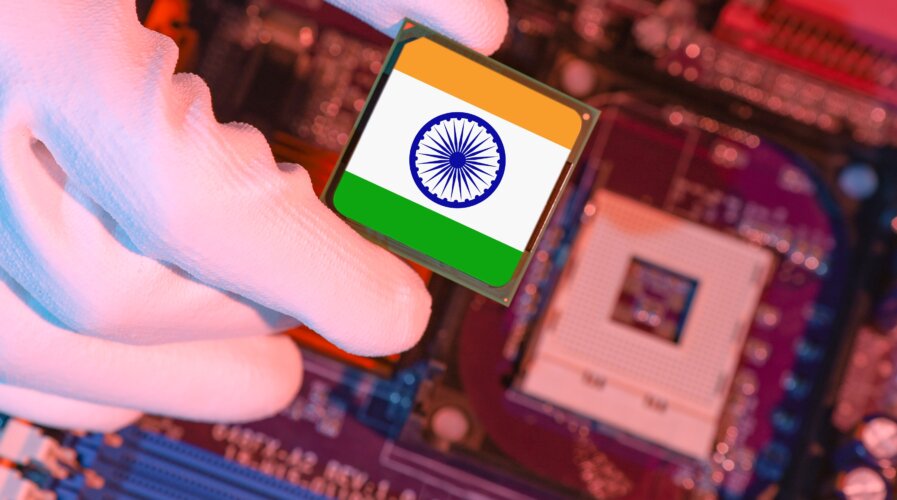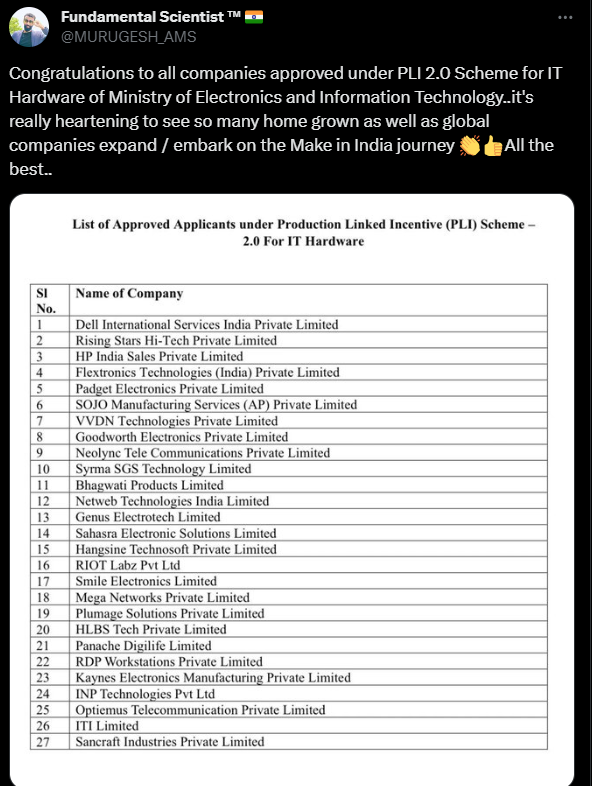[ad_1]

Despite many firms making use of for the scheme, many main corporations are absent.Source: Shutterstock
- 27 firms, together with Acer, Asus, Dell, HP, and Lenovo, be a part of India’s ‘Make in India’ initiative underneath the PLI scheme.
- 23 out of 27 authorised candidates are ready for day-zero manufacturing, with 4 beginning manufacturing within the subsequent 90 days.
- The PLI 2.0 Scheme for IT {hardware} closed in August and acquired purposes from 38 firms.
The production-linked incentive (PLI) scheme launched in India in March 2020 had a tepid begin, experiencing a big shortfall. Crafted to stimulate manufacturing in 14 sectors, with an outlay of ₹1.97-lakh crore (about US$26 billion), the PLI initiative is a cornerstone of the federal government’s imaginative and prescient to bolster home manufacturing, positioning India as a global export hub.
It all began with the federal government concentrating on cellular manufacturing, electrical parts, prescribed drugs, and medical gadget manufacturing. Since then, the idea has expanded to cowl a number of sectors, fostering manufacturing capabilities and export-oriented manufacturing. Ultimately, the Indian authorities goals to reinforce native provide chain capacities, introduce new downstream operations, and entice investments into high-tech manufacturing.
The PLI scheme concentrating on IT {hardware} was solely launched in February 2021, encompassing the production of laptops, tablets, all-in-one PCs, and servers, with an allotted price range of 73.5 billion rupees (US$1.02 billion). But this system confronted low participation ranges because of the incentives being perceived as inadequate. So, India determined extra incentives can be the perfect guess in luring electronics producers.
In May 2023, Delhi unveiled a 170 billion-rupee (US$2.1 billion) monetary incentive plan (PLI 2.0 scheme for IT {hardware}) to draw laptop, tablet, and other hardware makers to the South Asian nation, particularly within the wake of the China-US commerce tensions, creating an opportune second for firms to explore alternative production options. It was solely by the PLI 2.0 scheme that the Indian authorities started noticing higher uptake.
How profitable is the uptake of the PLI 2.0 scheme?
According to an official assertion on November 18, New Delhi has authorised subsidy purposes from 27 firms out of 40 candidates. The authorised firms embody Apple supplier Foxconn Technology Group, laptop big Lenovo Group, Dell, HP, and AsusTek Computer.

Ashwini Vaishnaw, the Union Cabinet Minister for Railways, Communications, Electronics and Information Technology. (Photo by TAUSEEF MUSTAFA / AFP).
“23 out of 27 approved applicants are ready to start manufacturing on day zero,” Ashwini Vaishnaw, India’s Minister for Railways, Communications, Electronics and Information Technology, mentioned. “Four companies will start production in the next 90 days.”
During the preliminary 12 months of the PLI scheme, firms are permitted to keep up their common import practices, with a gradual discount within the import quota commencing after September 2024, in response to local reports. All firms had been required to offer their import information for the previous three years, specifying the supply from which they import the gadgets.
Vaishnaw additionally famous that India expects the PLI-approved firms, masking home meeting of desktop and laptop computer PCs, tablets, and different tech {hardware}, to instantly create 50,000 jobs and not directly, round 150,000 extra jobs underneath the scheme, based mostly on a complete funding of US$360 million. He additionally mentioned the estimated worth of data know-how {hardware} manufacturing would attain US$42 billion.
Neither Apple nor Samsung utilized for the scheme
It seems that Apple has chosen to not take part in India’s PLI 2.0 scheme for IT {hardware}, primarily as a result of laptops and tablets lined by the scheme represent a comparatively small share of Apple’s complete gross sales within the Indian market, as per an ET report. The report signifies that Apple has no quick intentions for native manufacturing of those merchandise.
Quoting sources, the report additionally said that Apple’s manufacturing strategy deviates from the standard mannequin, counting on world digital contract producers as an alternative of building its manufacturing services. Apple additionally selected to not take part within the smartphone PLI scheme, as highlighted by the executives. Approximately 80% of Apple’s income in India is derived from smartphones, the cornerstone of the corporate’s product lineup.
As a end result, Apple’s strategic emphasis is on increasing iPhone manufacturing throughout the nation. It’s noteworthy that, even for smartphones, the tech big didn’t pursue PLI advantages, though its manufacturing companions, equivalent to Foxconn and Wistron, submitted purposes for the scheme.
On the opposite hand, regardless of benefiting from the smartphone-focused PLI initiative, Samsung, the South Korean tech big, has opted to not take part within the PLI 2.0 scheme. This determination is influenced by Samsung’s comparatively restricted presence within the laptop computer market, with the pill sector contributing little to the corporate’s income stream.

Companies authorised underneath PLI 2.0 Scheme for IT Hardware. Source: X.com.
[adinserter block=”4″]
[ad_2]
Source link